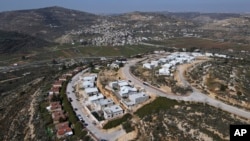The U.N. Security Council expressed its “deep concern and dismay” Monday on Israel’s announcement last week that it plans to expand settlements and retroactively legalize nine existing ones.
It is the first time in more than six years that the 15-nation Security Council has expressed itself about settlements, mainly due to the veto power of the United States, which traditionally acts to protect ally Israel at the U.N.
It comes at a time of rising tensions and violence between the two sides. At least 47 Palestinians and 10 Israelis have been killed since the start of the year.
“We strongly oppose Israel’s announcement that it will advance thousands of settlement units,” U.S. Ambassador Linda Thomas-Greenfield said. “And we strongly oppose Israel’s announcement that it will begin a process to retroactively legalize nine outposts in the West Bank that were previously illegal under Israeli law.
“These unilateral measures exacerbate tensions. They harm trust between the parties. They undermine the prospects for a negotiated two-state solution. The United States does not support these actions — full stop.”
After a weekend of diplomatic activity, including phone calls Saturday from U.S. Secretary of State Antony Blinken to Israeli Prime Minister Benjamin Netanyahu and Palestinian President Mahmoud Abbas, Washington signed up to what is known as a presidential statement from the council.
The Palestinians had originally sought a resolution to be voted on Monday, a move that could have forced the Biden administration to use its veto, at a moment when it wants to keep international focus on the war in Ukraine. Instead, the Palestinians, working with council member United Arab Emirates, withdrew the draft resolution and a presidential statement was agreed. It is a step below a resolution but must be unanimously agreed.
“The fact that we have a united front, everyone, to isolate one side, is a step in the right direction,” Palestinian envoy Riyad Mansour told reporters.
“This meeting was once again initiated to condemn Israel, this time for issuing building permits in already existing communities – already existing,” said Israeli Ambassador Gilad Erdan.
“Building permits in our homeland spark international uproar, while dead Jewish children elicit nothing. This is an utter disgrace.”
Thomas-Greenfield told the council that the United States strongly supports the presidential statement, which “demonstrates the Security Council’s unanimous, collective voice on these issues.”
The last time the Security Council made a pronouncement against Israel as a group was the adoption of resolution 2334 in December 2016. Fourteen Council members voted in favor of that resolution with the United States abstaining — just before the Obama administration left power. That resolution said that Israeli settlements constitute “a flagrant violation under international law” and all settlement activities in the occupied Palestinian territory occupied since 1967, including East Jerusalem, must “immediately and completely cease.”
Monday’s Security Council statement also reaffirmed its “unwavering commitment” to the vision of a two-state solution and that Israeli settlement activities “are dangerously imperiling” that possibility.
The Council called for calm, restraint and for upholding the historic status quo at the holy sites in Jerusalem. Several Council members expressed concern that violence could spike again as the Muslim holy month of Ramadan coincides this year with the Jewish Passover holiday and Easter.
In a first, the Council included language expressing concern about instances of discrimination, intolerance and hate speech “motivated by racism or directed against persons belonging to religious communities, in particular cases motivated by Islamophobia, anti-Semitism or Christianophobia.”
“In light of the alarming rise in extremist hate speech and incitement, it is vital that the Security Council has addressed these issues for the first time in a product,” said UAE Ambassador Lana Nusseibeh, who guided the effort for the Palestinians in the council.
She told reporters that the presidential statement is a strong, unified signal from the Council that they want to see “de-escalation, dialogue and a focus on the political parameters to a long-standing conflict.”
Meanwhile, Netanyahu’s office told the Biden administration Monday that it would not greenlight any new wildcat settlements in the occupied West Bank beyond the nine retroactively approved earlier this month.
That pledge to hold off on approving new settlements contradicts the Israeli government's guiding principles, which means Netanyahu could face a backlash from his far-right, pro-settler coalition partners. Construction in established settlements is expected to continue, as it has under past Israeli administrations.
Some information in this report is from The Associated Press.





